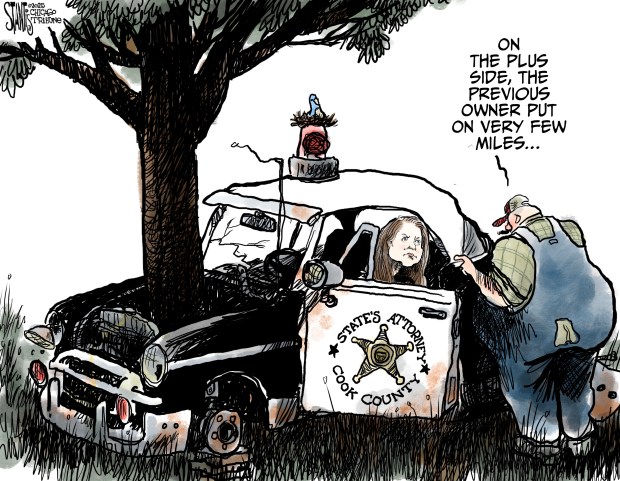As tens of millions of Americans were huddled in front of their televisions to watch the Kansas City Chiefs snatch their second consecutive Super Bowl victory, Europeans across the pond — or at least European politicians responsible for the continent’s defense — were still coming to grips with what former president and GOP presidential candidate Donald Trump said in front of his supporters over the weekend.
During a rally on Saturday, Trump reminisced about when he told a European leader that the United States under his watch wouldn’t come to that country’s defense if it failed to meet NATO’s defense spending benchmarks. “One of the presidents of a big country stood up and said, ‘Well, sir, if we don’t pay and we’re attacked by Russia, will you protect us?’ I said, ‘You didn’t pay. You’re delinquent. … No, I would not protect you. In fact, I would encourage them to do whatever the hell they want.’”
It didn’t take long for the reactions to come pouring in. The Europeans clearly didn’t appreciate the comments, even if the remarks weren’t necessarily surprising coming from a man who has a long record of viewing alliances in transactional terms. NATO Secretary General Jens Stoltenberg, who had a decent working relationship with Trump, issued a stern statement warning that “any suggestion that allies will not defend each other undermines all of our security, including that of the US, and puts American and European soldiers at increased risk.” Charles Michel, president of the European Council, called Trump’s remarks “reckless” without naming the former president.
It’s hard not to sympathize. It’s never a good idea for anybody to essentially invite an aggressor country such as Russia to treat the European continent as a personal playpen. Especially so when the person in charge of Russia, Vladimir Putin, has a habit of invading other countries (see Georgia in 2008, Ukraine in 2014 and Ukraine again in 2022).
But let’s be honest. Whether or not the meeting Trump recalled actually happened — former aides will tell you that Trump has a tendency to embellish stories — his comments nevertheless express a deep frustration with the current transatlantic security arrangement. Those frustrations are entirely legitimate, even if pundits and prognosticators want to shoot the messenger.
Ever since the beginning of the Cold War, the United States has taken on the role of Europe’s protector. NATO, the military alliance established in 1949, is for all intents and purposes an American creation upheld by American military power. During the four-decade contest with the Soviet Union, this arrangement made sense; Europe was still reeling from World War II and concerned first and foremost with rebuilding itself. At a time when the U.S. goal in Europe was to prevent Soviet hegemony on the continent, stationing hundreds of thousands of U.S. troops, tanks and tactical nuclear warheads was seen by successive U.S. presidents as a way to accomplish two things: Deter the Soviets from expanding and provide Washington’s partners in Europe with the time they needed to get back on their feet.
Over time, however, NATO became less about stopping the Soviets (and when the Soviet Union collapsed in 1991, the Russians) and more about entrenching U.S. primacy over Europe. Starting in the 1990s, the U.S. was a vocal booster of enlarging NATO to new frontiers; the alliance has nearly doubled its membership since the Soviet Union’s dissolution, even bringing in countries, such as North Macedonia and Montenegro, that don’t really enhance NATO’s collective military punch. The enlargement occurred even under Trump’s watch.
This arrangement was a pretty good deal for the Europeans, who in effect got their defense taken care of by the world’s only superpower. Money that would otherwise go toward their defense budgets was instead diverted toward domestic welfare programs, economic development and the social safety net. This was entirely reasonable for the Europeans. Why pump tens of billions of dollars into your defense industry when a superpower is willing to pick up the tab?
The problem, of course, is that this entire deal created extreme dependency. Europe’s defense industrial complex was left to wither on the vine because, frankly put, there was nothing for it to do other than export military equipment to countries outside Europe. The defense spending disparity between the U.S. and the rest of NATO deepened to a cavernous-like hole. Multiple U.S. presidents were always lecturing Europe to pump more cash into its defense budget but weren’t willing to spend the requisite political capital into pressing the issue. It took a war in Europe to jolt the continent from its decadeslong slumber. Even now, 20 of NATO’s 31 members still aren’t fulfilling the alliance’s mandate of spending at least 2% of their gross domestic product on defense.
It wouldn’t be unreasonable for the average American to take a look at this situation and call it unfair. Indeed, it is. You don’t need to be a member of the MAGA movement or even a passive supporter of Trump to find this entire thing a bit infuriating. At $17 trillion, it’s not like the European Union’s GDP can’t finance a military buildup and take primary ownership of its own defense. The issue isn’t money but rather political will.
Are Trump’s remarks deplorable to a lot of people? Sure. But go beyond the surface, and the complaints he makes aren’t all too different from those of other U.S. presidents dating to Dwight Eisenhower.
The question is whether the U.S. will do anything at all to rejigger the system and offload the burden for Europe’s defense onto the Europeans.
Daniel DePetris is a fellow at Defense Priorities and a foreign affairs columnist for the Chicago Tribune.
Submit a letter, of no more than 400 words, to the editor here or email letters@chicagotribune.com.



